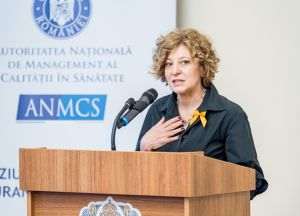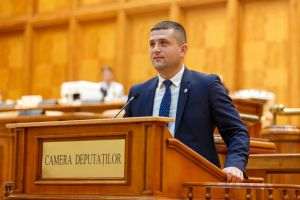On Saturday, Pope Francis presented a synopsis of his visit to Turkey (November 28th -November 30), where, facing Bartholomew the 1st, Patriarch of Constantinople, he has explicitly stated his intention of reuniting the Catholic and Orthodox Church:
"The only thing that the Catholic Church wants and what I am also trying to do as a bishop of Rome... is the unity with the Orthodox churches", the pontiff said, at the time, and he added that the Catholic Church poses no conditions for the reunification, other than professing the common belief.
Even though the idea of reuniting the Churches has begun making the rounds since back in the 1960s, even though the Vatican took significant steps in that direction (such as the visit to Romania, in May 1999, of John Paul the 2nd - the first pope after the Great Schism to visit an orthodox country, where he was received by the Patriarch of the Romanian Orthodox Church, Teoctist), still, the current event is the first that hints it will be followed by the concrete action of unification:
"We are ready to seek together... the ways which will guarantee the unity of the Church in the current circumstances", pope Francis said in Istanbul.
Beyond the fact that it makes sense to fix the schism between confessions that share the same belief, the Catholic intention of reunification is also being driven by the pressure felt following the changes the world is going through lately, of which the global financial crisis is the most prominent.
The stake however, is greater in scale than even a revolution, because it doesn't just raise the issue of the viability of the system that we live in, but an even deeper one - that our souls - and on an even higher level - of the way humanity views divinity (God) and the way those views and its relationship with it get updated in time.
• RELIGIOUS ILLITERACY
In the Cathedral of Strasbourg, a group of German teens were admiring a superb ivory statue of Christ, sculpted in the 16th century, exclaiming: "It's Spartacus! It's Spartacus!"
This occurrence was recounted on Friday, at Radio Vatican, by Cardinal Jean Louis Tauran, the next day after the third Catholic Muslim Summit, organized, in Rome, by the Pontifical Council for Interreligious Dialogue (which he serves as president of).
On Radio Vatican, the Cardinal showed his amazement at "the religious illiteracy" of the youngsters living in the heart of Europe, without realizing that he has in fact voiced an acute concern that exists at the top of the Catholic Church (a concern which the Orthodox Church also shares).
Because even though it is said that Spartacus died in battle, still, the six thousand slaves that survived the revolt were crucified along the road to between Rome and Capua, on Via Appia, meaning that Spartacus can induce the image of a man who has been crucified, in the mind of a teen, who has not yet learned attention to details and will perhaps never get used to it.
And if we accept that they could both be imagined being crucified, then how can we distinguish Christ from Spartacus?
Depending on context and nothing more.
What would the sculpture of Spartacus be doing in the Cathedral of Strasbourg?
What would it be doing in any Christian church?!
When you find a depiction of a crucifixion in a church, that can only be Christ.
The confusion between Christ and Spartacus not only denotes "religious illiteracy", like Cardinal Tauran says, nor simply lack of culture, but also the fact that people have lost any connection to the church and that its function has weakened all over the world.
• THE MORAL CONSEQUENCES OF THE FINANCIAL CRISIS
This is the true concern of the Church, and its heads are aware of the religious crisis that Christianity is in: faith no longer succeeds in providing the moral values which guide our actions, they have become worn down under the pressure of the values of the globalizing, finance-based system, - adapted to the functionality of the system (after they had been replaced and even exterminated by a rudimentary atheism in the communist parts of the world).
To put it synthetically, simply and well expressed, "Nothing is sacred anymore", but that is nothing new, because, for thousands of years, there has been a voice for every generation to vehemently accuse its contemporaries of weakness before the worldly temptations - money, power, sex - and their integration within the social economic rules of the system, in violation of the ten commandments, to satisfy their needs and passions.
In fact, that is a meaning too - it may be "heathen", providing no elevation to the soul, but it does provide a goal and a meaning to life and all of us gets experience that, everyone of us has inside a mix of values, even if we mentioned just the moral reflex determined by needs, rather than temptations.
This opens the path for a system of moral values (axiology) subordinated to material goods, which comes second, is complementary and often times an "alternative" to the elevation of the soul provided by faith.
However, the great novelty of the last few years is the crisis of the system - social, economic and financial - ruining the common axiology, without humanity glimpsing the solution - in other words a system that would replace the current one, which has been proven dysfunctional.
Credit-based society, going through slavery, feudalism and capitalism, begins to show its inability to provide for the human meanings, leaving men prey to stupefaction, moral paralysis, hazard and chaos.
Paradoxically, this situation places a heavy responsibility on religion, the church and faith.
Especially on the Christianity, whose supporters - one third of the population of the planet - is the source of the financial crisis.
• THE BURDEN OF THE CHURCH
The church seems bent under the burden, viewing it as an opportunity, but more painfully, aware of the failure that awaits it (French cardinal Tauran reported that France has tried to bring religious education into schools, but it hasn't found capable teachers).
Let's fill out the picture: the theological bodies themselves are experimenting with new attitudes towards religion, tormented by controversies at the highest level, resuming the talks about all the merits of Christianity, which have been consolidated over its two millennia of existence.
From that point of view, the debates around the holy text carried out at the highest levels of the Christian churches, as this third millennium begins, don't have any precedent other than in the controversies of the first millennium, when the divine nature of Christ was acknowledged and the Bible was canonized.
Still, the masses of believers are very rarely privy to the worries of its "shepherds", even though lately, they have begun catching glimpses of them, with great difficulty, through unexpected venues such as, for instance, the novels of Dan Brown ("The da Vinci code"), as well as through the alternative rewriting of the goals of history.
If one types "the crisis of religion" into a search engine, some of the documents displayed decry the loss of relevance of faith, but they are not recent (and they seem to apply to any century of the two millennia that Christianity has been around). Another party refers to the recent persecution launched against the Christians of Syria and Iraq, and the others have no connection to the subject, as if Google (for example) were confused.
The confusion between "freedom through faith" - "freedom of faith" is often involuntary, like it has happened in October, in Bucharest, in the international workshop, organized in the Parliament's Palace, by the Ministry of Foreign Affairs, during the mandate of Titus Corlăţean, where, even though the list of topics mentioned "religion" and "freedom" ("Legislation, religion and freedom. An approach in the context of globalization"), none of the academic reports dared to venture into metaphysics; instead, all of them clung to the randomness and mediocrity of politics, missing out on a debate necessary at this stage in the evolution of humanity.
(To be continued)
AUTHOR'S NOTE
I am publishing this article, even though the text is not yet completed.
I have mapped out its structure, I know what I want to convey, but there is a lot of ground to cover, the necessary documentation spans beyond the horizon - where the sky meets the earth - and I can't predict the multitude of paths that can be taken towards that spot, in order for my statements to be clear and definitive.
On the other hand, the evolution of religious conscience and the reactions of the religious institutions force to publish it now.
This is why I have decided to publish this article in episodes, in its risky, unfinished condition (which represents a first, for BURSA, which has never accepted such risks).
I don't know when I am going to write Episode 2.
Maybe on Thursday or on Friday, or next week.
At any rate, not tomorrow.
















































